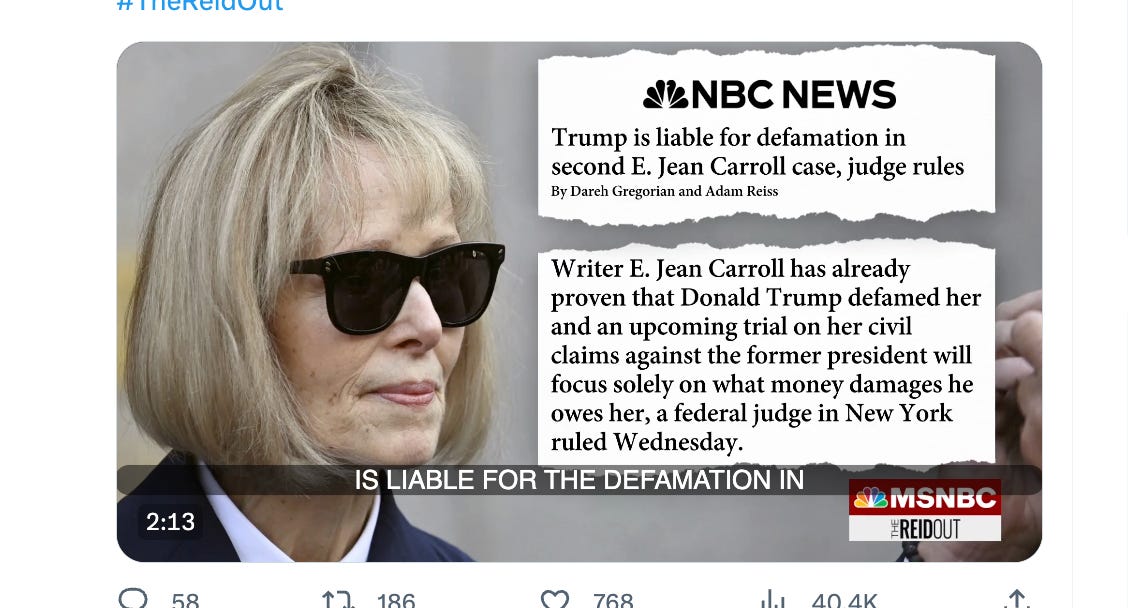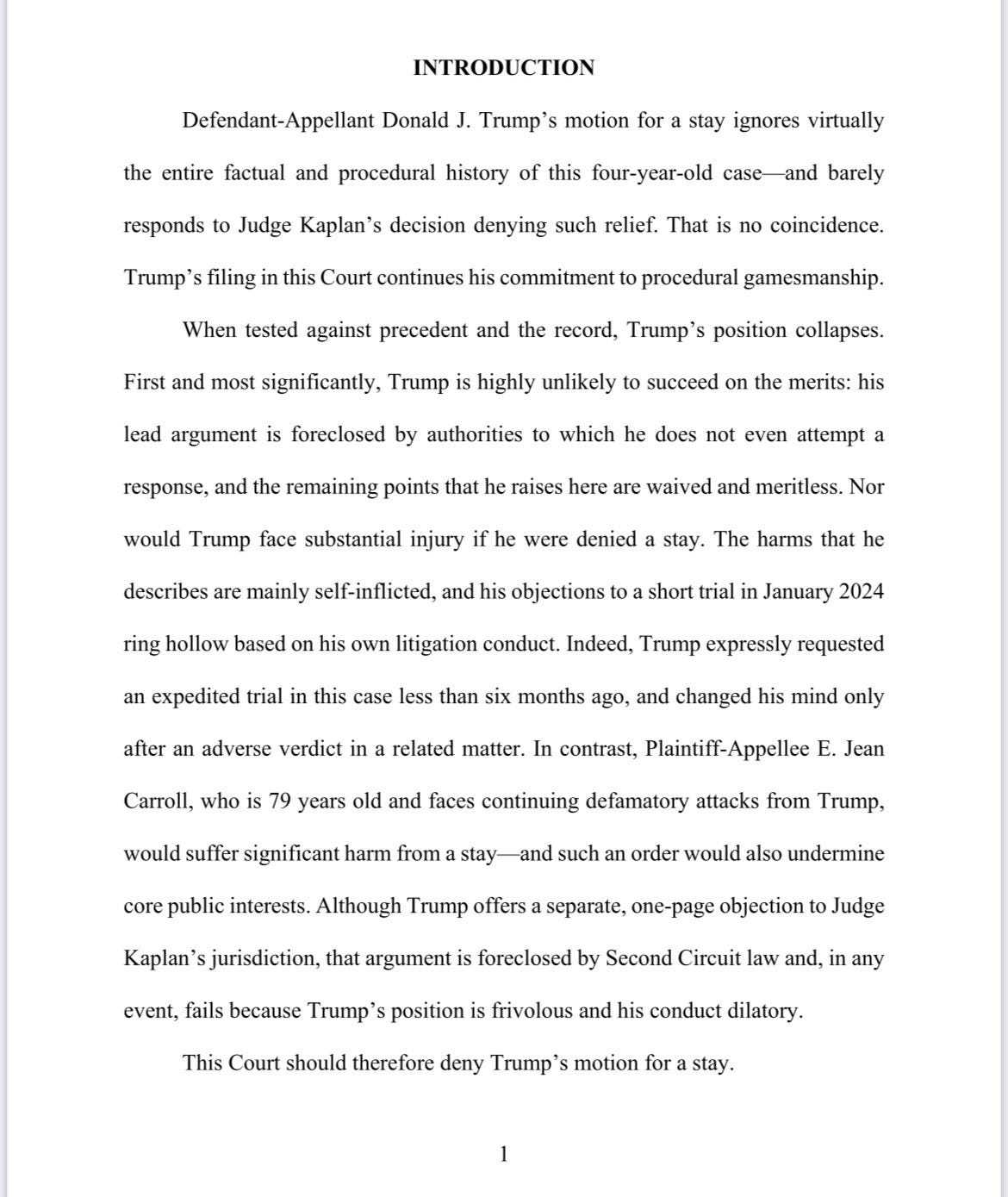[Part 3]
In the Mar-a-Lago case, reporting today confirmed that Jack Smith has a cooperating witness on the inside. It seemed likely from earlier reporting and the contents of the superseding indictment that Yuscil Taveras, the IT guy at Mar-a-Lago, had decided to flip and testify against Trump after receiving advice from a lawyer in the public defender’s office, in place of the lawyer that one of Trump’s PACs was reportedly funding for him. That deal was confirmed today.
That’s one deal done. The interesting question is what Trump co-defendants Waltine Nauta and Carlos de Oliveira do now. Will they really go to prison for Trump? The government has already asked Judge Aileen Cannon to schedule “
Garcia” hearings for the two, in which they’d be advised of their lawyer’s conflict of interest in representing them and asked on the record whether they were willing to proceed with the lawyer regardless. But Cannon’s conduct of the case before her has been markedly different than other judges, including the Washington, D.C. judge who determined that Taveras should consult with independent counsel. In fact, it was she who, when the government requested the
Garcia hearing suggested that the defendants should object to the government’s use of a grand jury in Washington, D.C. to conduct investigation, a step that was entirely proper despite the Judge’s implication to the contrary.
Also today in the Mar-a-Lago case, news from
ABC, which obtained transcripts of Trump lawyer Evan Corcoran’s recordings about his interactions with Trump. Corcoran advised Trump that if he didn’t comply with the government’s subpoena, they could get a search warrant for Mar-a-Lago. ABC reported, “Evan Corcoran, warned the former president in person, at Mar-a-Lago, that not only did Trump have to fully comply with the subpoena, but that the FBI might search the estate if he didn't, according to Corcoran's audio notes following the conversation.”
In other words, Trump knew that a search was likely in the works when he set Nauta and De Oliveira to the task of removing boxes from storage in Mar-a-Lago, and subsequently returning fewer of them than were removed. The inference is that Trump knowingly removed items he did not want prosecutors to find. That’s a stunning development and advance in what we know about Jack Smith’s evidence against Trump on the obstruction charge.
So much for Trump’s outraged protestations the day of the search that it happened without warning. That day, Trump said, “after working and cooperating with the relevant Government agencies, this unannounced raid on my home was not necessary or appropriate.” He claimed that it was an effort to interfere with his bid to return to the White House, saying, “such an assault could only take place in broken, Third-World Countries.” That attempt at outrage looks different now that we know the facts—that the government bent over backwards to give Trump the opportunity to return classified documents he kept; that he didn’t do so, even removing some once he learned a search was possible. Prosecutors can argue to jurors that the evidence shows that Trump deliberately secreted items out of view of his lawyers and also of DOJ, anticipating the search. The evidence against Trump could get even worse for Trump if his remaining co-defendants flip.
The Special Counsel in the Hunter Biden cases says he will seek an indictment from the grand jury on gun-related charges by end of the month. It’s unusual for prosecutors to publicly discuss grand jury proceedings. That is happening here because the Judge asked the government for an update on the status of the case, in view of the upcoming expiration of the time permitted for prosecutors to proceed under the federal Speedy Trial Act.
Prosecutors have limited time after they charged Hunter Biden using an “information” rather than an indictment, even though the guilty plea that was supposed to resolve those charges fell apart. Prosecutors’ time to proceed to trial will expire at the end of the month, but they advised the judge that will not pose a problem because they intend to seek an indictment before they are out of time.
Counting procedures under the Speedy Trial Act are arcane at the best of times, and this case is in a particularly confusing posture. If you want to puzzle out the precise time calculation for yourself, Special Counsel for the Hunter Biden matter David Weiss’s filing is
here.
An interesting question—what if the grand jury declines to indict, requesting additional investigative work or witnesses before they are prepared to vote? Prosecutors could likely go to the Judge with a motion to exclude the time it takes to comply with any requests from the time that counts towards the expiration of the Speedy Trial Act clock, but these are the sorts of complicated issues that carry a risk on appeal if there is a conviction. Prosecutors usually like to avoid them. Hunter Biden’s lawyer, Abbe Lowell, suggested on MSNBC this evening that it would make sense for prosecutors to restore the deal they originally offered Biden and conclude plea negotiations. The clock is ticking.
Peter Navarro’s trial is all but over. The prosecution has presented all of its evidence and rested. The defense told the court it won’t be calling any witnesses. It seems almost certain Navarro will be convicted, because it’s a simple case. Congress sent Navarro a subpoena for testimony and documents and he refused to comply. The only real question is how quickly the jury will return a guilty verdict after closing arguments tomorrow.
We end tonight on a positive note. Remember the horrible spinning buoys Texas placed in the Rio Grande in an effort to prevent migrants from crossing the river, leading to horrible accidents? DOJ filed a lawsuit, arguing that the placement of the barriers violated federal law that bars obstruction of navigable waterways.
Today, a federal judge enjoined the state and Governor Greg Abbott from constructing new blockades and ordered them to remove existing ones by September 15. The Court expressly noted that despite Governor Abbott’s bravado and his claim that he wasn’t “asking for permission” to block migrants, federal law required him to do so.
DISCUSSION
Governor Abbott announced that he was not "asking for permission" for Operation Lone Star, the anti-immigration program under which Texas
constructed the floating barrier.* Unfortunately for Texas, permission is exactly
4 @GregAbbott_TX, Twitter, (Mar. 21, 2023, 5:29 PM),
https://twitter.com/GregAbbott TX/status/1638306917939380224?t=BBOrNKcTg
wyDnOj8gRiQKQ&s=19.
It was quite a day. We’ve noticed this before, that there are a lot of legal issues and rulings on a lot of different fronts, all coming to a head simultaneously. Many, but not all of them, involve Trump. Tonight, rather than looking at each situation in detail, we’ll try to extract the most...

joycevance.substack.com





